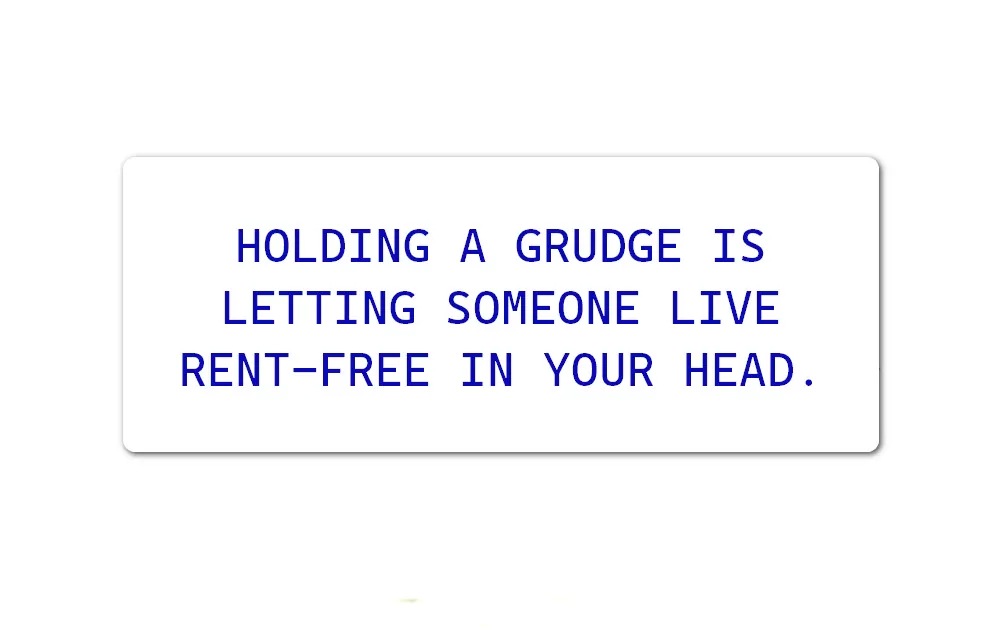Today's Saturday • 8 mins read
— By Dr. Sandip Roy.
“Not forgiving is like drinking rat poison and then waiting for the rat to pass away.”
― Anne Lamott, Traveling Mercies: Some Thoughts on Faith
Unforgiveness feeds grudges, which then fuel the desire for vengeance.
A grudge has two ingredients: anger and bitterness. Both of those emotions are dark enough to keep the grudge-holder in misery.
Someone who holds a grudge against you must be suffering on the inside. And the longer they suffer, the more determined they can get to harm you.
Even if someone has less power than you, a grudge can drive them to hurt you in unforeseen ways.
How can you handle them to stop being their intended target?
Why Is A Grudge-Bearing Person Dangerous?
A grudge can make a person dangerous. Hurtful feelings in grudge-bearing people harden into anger and hatred over time.
- They can mortally harm you if they think you hurt them, even if you’re innocent, or if they’re weaker than you.
- Grudge-holders often hold the grudge, thinking that if they keep holding it, they can get revenge. If they let go of their grudge, they may forget the offense, and then that person will hurt them again.
- What makes them so much more dangerous is that they believe that only an act of revenge on you will bring them peace. It is a twisted, prehistoric, reptilian logic that warps their rational thinking.

How To Deal With Someone Who Holds A Grudge Against You
Most grudge-holders think that only a payback or revenge can fix their hurt. They can hurt those around you, not just you.
Here are some tips to help if someone is holding a grudge against you:
Step 1: Get A Third-Person POV.
The grudge-holder may deeply resent what you did. They may be wrong, or be completely justified in holding it against you.
So, before giving yourself a clean chit, get a third-person perspective to see if you are innocent.
Step 2: Acknowledge The Issue.
If that third person feels it was your fault, then accept it.
Write down the details of how things went, and that you got around to actually doing something extremely wrong.
Sometimes, people hold a grudge against you for things that you didn’t even do. This can be because of a misunderstanding or miscommunication, or their evil nature.
Whatever the reason, it’s important to acknowledge the issue that is causing them to hold a grudge against you and try to fix it.
The first step is to identify what caused the grudge in the first place. Ponder over the issue before approaching them to fill in the gaps in your analysis.
If they do tell you, then it should be easy enough to figure out what caused them to feel this way.
It can get difficult if they don’t tell you. In such cases, your calculated guess would be the best answer.
Once you are armed with the reason that caused them to feel this way, then it’s time for step two: approach them.
Grudges rob both parties of their happiness.
Step 3: Talk To The Other Person (But Take Someone Along).
This is often a difficult task. They are hurt and may resist your efforts to reconcile with them.
Approach them with the understanding that the person you are about to talk to could be feeling too hurt to open up.
The trauma they felt may make it hard for them to reveal what exactly has unsettled them.
Nonetheless, just because someone with a grudge has turned hostile toward you does not make you weaker or less resourceful than they are. Keep this in mind before confronting them.
When you talk to the other person, it’s essential not just to try to understand their point of view, but also to give them your side of the story.
Face everyone with boldness and love.
Talk to the other person about the issue that is causing them to have a grudge against you.
It is important not just to give your side of the story, but also to listen and try to understand their perspective.
Step 4: Decide & Mutually Agree On What You Want To Do Next.
Suppose they have already carried out their vengeful act. What do you do then?
We all have been there — someone has hurt us, and we want to get back at them. But what should we do next?
- Should we confront them?
- Should we forgive them?
- Should we avoid them?
Ideally, you should forgive the person who has wronged you, for holding a grudge will only hurt you more eventually, and not just in the present.
Not so ideally, throw out that person from your mind and memory. Live your life as if they never existed in your life, like you never met them or have any memories of them. Focus on what makes you truly happy.
Step 5: Do What You Said You Would Do.
Be a person of integrity. Do whatever you agreed upon to fix their grudge.
If you do not do what you said you would, the grudge can get more bitter. And they can resolve to hurt you more severely.
Don’t let the cycle of revenge go on forever.
How To Handle A Colleague Who Holds A Grudge Against You
Here are some tips to deal with someone at the office holding a grudge against you:
- Realize that a grudge can be toxic for your health, well-being, and future promotion prospects.
- Try to understand where they are coming from — grudges and revenge may be a cultural issue.
- Let them know that you want to work through this and agree on a time to talk it out.
- Keep in mind that they might have their feelings masquerading as a grudge.
- Ask them what they would like from you to drop the grudge against you.
- Offer them something positive before ending the conversation.
- Keep future communication channels open with them.
When a colleague holds a grudge against you, take proactive steps to break the silence and talk it out with them. Handle them with both courage and kindness.
Explain the situation from your point of view. Make your point while remaining empathetic. Offer to do something to resolve the issue before it blows up.
Don’t let your inaction or callousness fill them with more fury and revenge plans.
In an office, one may hold a grudge if they are sensitive to criticism or feedback, feel offended for being assigned more work, were passed over for a promotion, or if their colleagues do not like them.
Narcissists often feel jealous and hold grudges for minor slights.
It can make teamwork difficult, so you must quickly deal with someone who has a grudge while remaining professional.
FAQs
What is the best way to handle someone who is resentful toward you?
It is more rational and healthier to find common ground with them and resolve the issue amicably than to live under the constant stress of a cold war.
Is it worth holding a counter-grudge?
Holding a counter-grudge merely tightens the grip of the grudge-holder on you. Your grudge-in-revenge allows them to occupy a rent-free room in your head.
Why does someone hold grudges against you?
People may also hold grudges if they have unrealistic expectations from you, have a low threshold for intolerance, are inherently jealous or envious, feel unjustly left out, and have malicious intentions towards you.
Most of the reasons why people hold grudges are apparently rooted in fear. They often have an unconscious fear of being hurt, betrayed, disrespected, or socially rejected.
Final Words
- When at fault, please apologize.
- When they won’t change, let go.
Some people cannot forgive. They are too obstinate to say “Sorry” and move on. It’s their failing. You are not obligated to live in their rented guilt.
Let go and live your life in peace. You owe it to yourself.
Never hold a grudge. It’s a waste of time and energy. It’s more of a punishment to yourself.
√ Also Read: What Forgiveness Is Not (And What It Actually Is)
√ Please share it with someone if you found this helpful.
» You deserve happiness! Choosing therapy could be your best decision.
...
• Disclosure: Buying via our links earns us a small commission.
